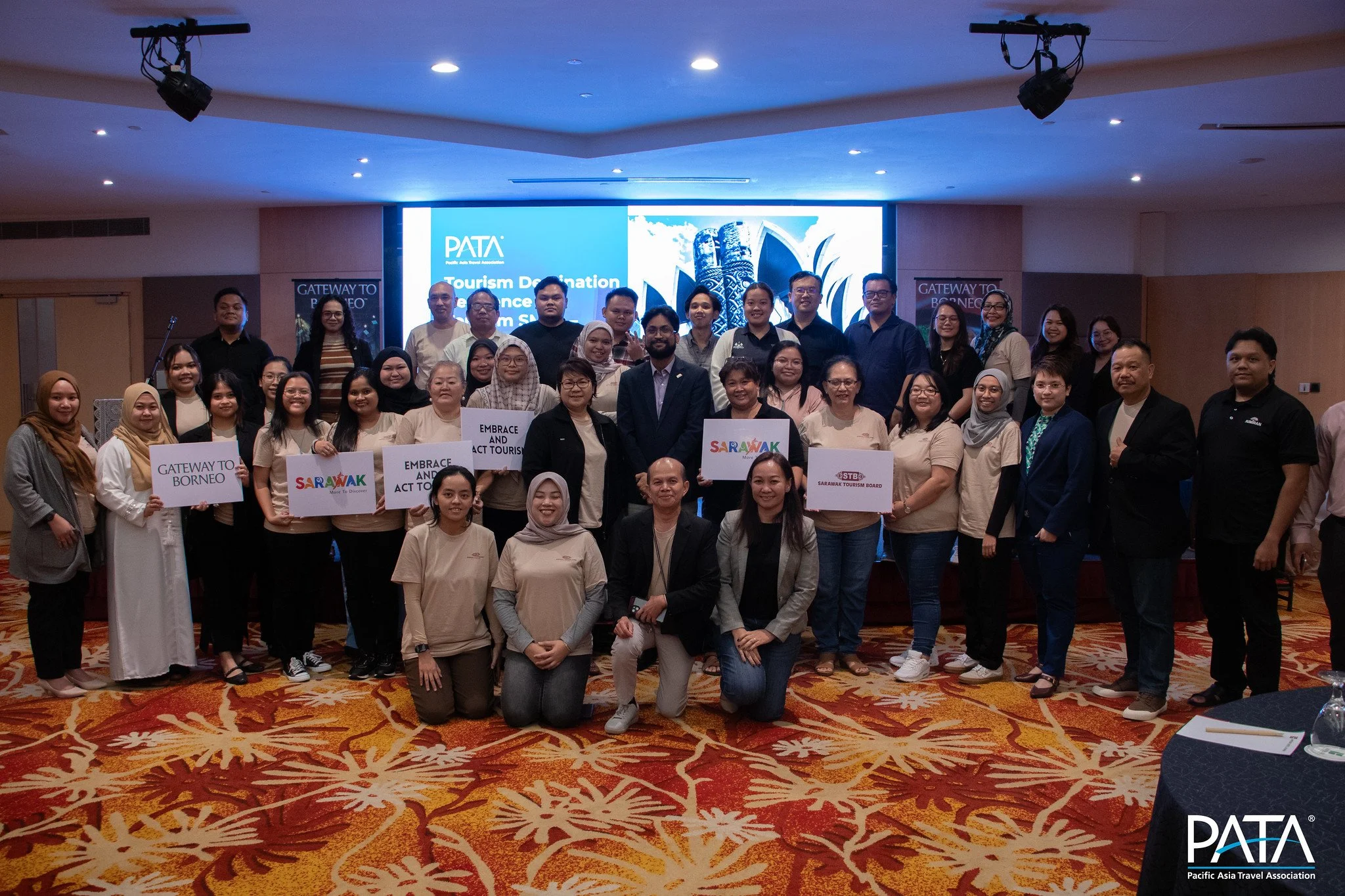PATA Takes the Tourism Destination Resilience (TDR) Programme to Sarawak, Malaysia
PATA launched the Tourism Destination Resilience (TDR) Programme in 2021 as a response to the COVID-19 pandemic. The programme aims to assist in the rapid, robust, and responsible reopening of international tourism by enhancing the resilience and sustainability of Asia Pacific destinations. TDR comprises both online and offline capacity-building components. The online component includes a 10-module course, freely available in six languages, a library with hundreds of reliable fact-based and actionable online resources, and tools for destinations to assess their current levels of risk exposure and resilience.
The on-site capacity-building programme is designed for National Tourism Organisations (NTOs) and Destination Management Organisations (DMOs). PATA conducted workshops in 2021 and 2022 for NTOs and DMOs in Vietnam, Cambodia, Indonesia and the Philippines.
In 2023, the TDR programme was expanded to target another crucial stakeholder in destinations: the micro, small and medium-sized enterprises (MSMEs). With the support and expertise of Visa, PATA developed a new course to enhance tourism businesses' financial literacy and digital competency. Similar to the online course for destinations, the complimentary Finance and Digital Skills for Tourism SMEs course is available in six languages on the SRC (Sustainability Resource Centre) platform. PATA and Visa also conducted in-person workshops for 120 tourism businesses in four destinations. Read about it here.
TDR in Sarawak
At the recent PATA Annual Summit, held in Macao from May 15-17, PATA signed a Memorandum of Understanding (MoU) with the Sarawak Tourism Board to advance sustainability in Sarawak's tourism industry. The first initiative from this collaboration is the implementation of the TDR programme in Sarawak. The training took place from May 20-24. Here are some of the highlights:
On May 20th and 21st, at the Imperial Hotel in Kuching, members of the Sarawak Tourism Board received training on the TDR course for destinations. The workshop was led by Mr Bijan Khazai, CEO of Hotel Resilient and Risklayer GmbH. Bijan has over 20 years of experience in academia and as a consultant in a number of international consulting and research projects on urban disaster risk management, hospitality and tourism resilience. Additionally, he was one of the experts involved in the development of PATA's TDR framework and online course.
On Day 1, the workshop started with welcoming remarks from the CEO of the Sarawak Tourism Board, Ms Sharzede Datu Haji Salleh Askor, followed by opening remarks from PATA CEO Noor Ahmad Hamid and by the Minister of Tourism, Creative Industry and Performing Arts, the Honourable Dato Sri Haji Abdul Karim Rahman Hamzah, to launch the programme in Sarawak.
Bijan commenced the workshop with an overview of the TDR training programme, engaging participants in a quiz to assess their current understanding of resilience and related concepts, and elucidating PATA's definition of the TDR framework. Next, he introduced the first key step of the framework: risk assessment, including its definition, types of risks and their impacts, and the difference between concepts such as risk, hazard, crisis, disaster, vulnerability and exposure.
Bijan Khazai, CEO of Hotel Resilient and Risklayer GmbH
Then, participants engaged in a practical exercise to put the contents into practice. They were tasked with creating a risk matrix for Sarawak's tourism industry. Organised into groups, they deliberated on six scenarios posing potential threats to the local tourism sector, ranging from natural disasters to health and safety risks. These scenarios were evaluated based on their likelihood (rated from 1 - Very Unlikely to 5 - Very Likely) and severity (rated from 1 - Limited to 5 - Catastrophic) to ascertain the comparative risk levels among them. Following this assessment, participants explored the potential impacts of each scenario on tourism and proposed various strategies and measures to mitigate their potential consequences in Sarawak.
At the end of Day 1, Bijan presented how risk assessments can be applied to effectively mitigate and manage risks.
On Day 2, the trainer delved into the concept of risk management, the second step towards TDR, and introduced the Destination Resilience and Sustainability Scorecard with a group activity. Following a coffee break, the session continued with discussions on emergency preparedness and crisis communication, complemented by another practical exercise aimed at reinforcing the learning objectives.
During the latter part of Day 2, the focus shifted to the final key step of TDR – adaptive capacity. This encompassed discussions on enhancing a destination's institutional, societal and financial capacity to bolster resilience. Topics included investment in resilient infrastructure and services, strategies for increasing sustainability through practices such as circular economy initiatives, nature-based solutions, community-based tourism, carbon projects and the attainment of sustainability certifications.
These discussions aimed to equip participants with a comprehensive understanding of how destinations can enhance their resilience and sustainability in the face of various challenges.
The workshop was attended by 39 participants from the public sector, including from the Sarawak Tourism Board, Sarawak Forestry Corporation, Ministry of Energy and Environment, Ministry of Transport, Ministry of Natural Resources and Urban Development, Sarawak Convention Bureau, Sarawak Museum Department, among others.
On the last two days of the training, May 23-24, PATA welcomed new participants for the second part of the TDR programme: owners and managers of tourism MSMEs. The Finance and Digital Skills workshop was led by Mr Pavnesh Kumar, PATA Director of Sustainability and Research.
On Day 3, participants underwent training in financial management, beginning with fundamental accounting principles and key terminology including equity, liability, profit, and assets. The session in the first half also covered the most common financial statements such as balance sheets, income statements and cash flow statements, together with related concepts such as break-even point and profit and loss analysis. To reinforce comprehension, a group activity was conducted to assess participants' understanding of these concepts.
After the lunch break, Pavnesh delved into funding and financing options available for MSMEs in Malaysia, alongside an explanation of the concept of credit scores. Participants were also introduced to the prevalent internal and external risks confronting businesses and the strategies for mitigating these risks, particularly through financial risk management.
Pavnesh Kumar, PATA Director of Sustainability and Research.
Lastly, the session highlighted the financial advantages of embracing sustainability for MSMEs, elucidating the primary areas where businesses can reduce costs by adopting sustainable practices. In group discussions, participants compiled lists of sustainability strategies they aimed to integrate into their businesses, identified associated challenges, and brainstormed solutions to overcome these obstacles.
Day 4 was dedicated to exploring digital skills essential for tourism MSMEs. The session commenced with a quiz designed to assess the current level of digitalisation within participating businesses. Next, the trainer underscored the importance of digitalisation in the post-COVID-19 tourism landscape, highlighting the various aspects of business operations that can be digitalised, providing examples of applications or software that facilitate this transition. The first segment of the session also delved into digital and online payment systems, outlining their advantages, different types, and offering guidance on setting up an online payment gateway.
In the latter part of the session, attention turned to digital marketing strategies tailored for tourism SMEs seeking to enhance their online visibility. This segment encompassed guidance on establishing a robust online presence through avenues such as website development, leveraging social media platforms, engaging with review websites and optimising Google My Business listings. Participants were also introduced to opportunities for digital advertising across platforms such as Google Ads, email marketing and social media channels.
Finally, Pavnesh shed light on the prevalent cyber threats confronting MSMEs in Malaysia and outlined preventive measures to safeguard against them, ensuring both the business and its customers remain protected while navigating online.
The workshop was attended by 42 participants, mostly managers and directors of hotels, ecolodges and resorts as well as tour operators and travel agencies.
PATA extends its sincere gratitude to the Sarawak Tourism Board for embracing the Tourism Destination Resilience programme and for their commitment to a more sustainable and resilient tourism industry. The Association also thanks the trainers, participants, and all involved parties for their dedication and contribution to this event's success.
Do you have any questions about the Tourism Destination Resilience (TDR) programme – the online course or in-person workshops? Get in touch with us at ssr@pata.org.
Also, don't miss PATA's newsletters for updates on this and other sustainability and resilience initiatives.













